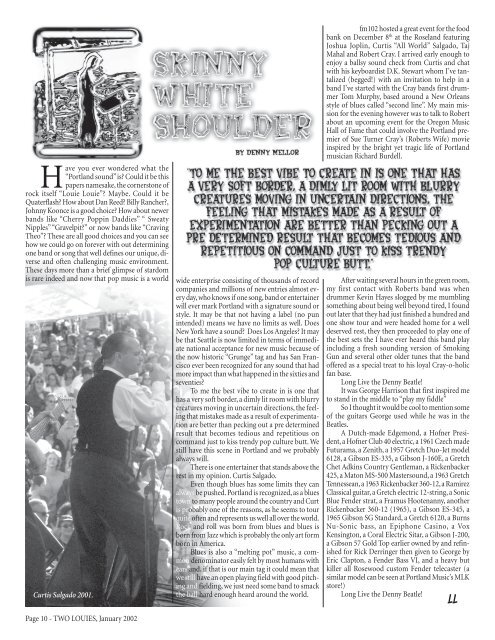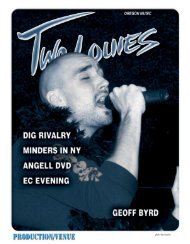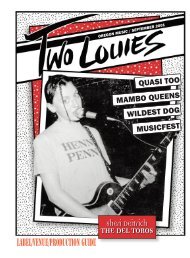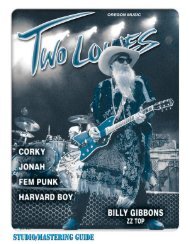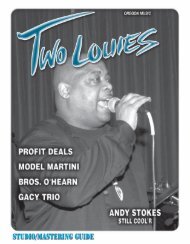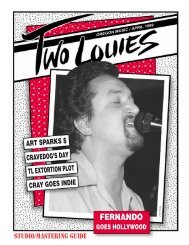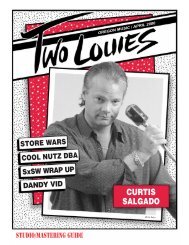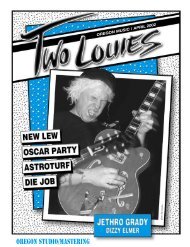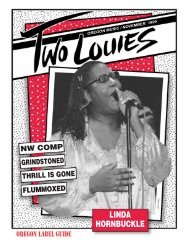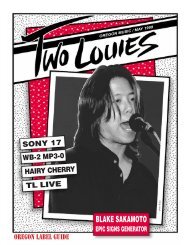OREGON STUDIO/MASTERING - Two Louies Magazine
OREGON STUDIO/MASTERING - Two Louies Magazine
OREGON STUDIO/MASTERING - Two Louies Magazine
Create successful ePaper yourself
Turn your PDF publications into a flip-book with our unique Google optimized e-Paper software.
Have you ever wondered what the<br />
“Portland sound” is? Could it be this<br />
papers namesake, the cornerstone of<br />
rock itself “Louie Louie”? Maybe. Could it be<br />
Quaterflash? How about Dan Reed? Billy Rancher?,<br />
Johnny Koonce is a good choice? How about newer<br />
bands like “Cherry Poppin Daddies” “ Sweaty<br />
Nipples” “Gravelpit?” or now bands like “Craving<br />
Theo”? These are all good choices and you can see<br />
how we could go on forever with out determining<br />
one band or song that well defines our unique, diverse<br />
and often challenging music environment.<br />
These days more than a brief glimpse of stardom<br />
is rare indeed and now that pop music is a world wide enterprise consisting of thousands of record<br />
companies and millions of new entries almost every<br />
day, who knows if one song, band or entertainer<br />
will ever mark Portland with a signature sound or<br />
style. It may be that not having a label (no pun<br />
intended) means we have no limits as well. Does<br />
New York have a sound? Does Los Angeles? It may<br />
be that Seattle is now limited in terms of immediate<br />
national acceptance for new music because of<br />
the now historic “Grunge” tag and has San Francisco<br />
ever been recognized for any sound that had<br />
more impact than what happened in the sixties and<br />
seventies?<br />
To me the best vibe to create in is one that<br />
has a very soft border, a dimly lit room with blurry<br />
creatures moving in uncertain directions, the feeling<br />
that mistakes made as a result of experimentation<br />
are better than pecking out a pre determined<br />
result that becomes tedious and repetitious on<br />
command just to kiss trendy pop culture butt. We<br />
still have this scene in Portland and we probably<br />
always will.<br />
There is one entertainer that stands above the<br />
rest in my opinion. Curtis Salgado.<br />
Even though blues has some limits they can<br />
always be pushed. Portland is recognized, as a blues<br />
town to many people around the country and Curt<br />
is probably one of the reasons, as he seems to tour<br />
quite often and represents us well all over the world.<br />
Rock and roll was born from blues and blues is<br />
born from Jazz which is probably the only art form<br />
born in America.<br />
Blues is also a “melting pot” music, a common<br />
denominator easily felt by most humans with<br />
ears and, if that is our main tag it could mean that<br />
we still have an open playing field with good pitching<br />
and fielding, we just need some band to smack<br />
Curtis Salgado 2001.<br />
the ball hard enough heard around the world.<br />
Page 10 - TWO LOUIES, January 2002<br />
KINK fm102 hosted a great event for the food<br />
bank on December 8 th at the Roseland featuring<br />
Joshua Joplin, Curtis “All World” Salgado, Taj<br />
Mahal and Robert Cray. I arrived early enough to<br />
enjoy a ballsy sound check from Curtis and chat<br />
with his keyboardist D.K. Stewart whom I’ve tantalized<br />
(begged!) with an invitation to help in a<br />
band I’ve started with the Cray bands first drummer<br />
Tom Murphy, based around a New Orleans<br />
style of blues called “second line”. My main mission<br />
for the evening however was to talk to Robert<br />
about an upcoming event for the Oregon Music<br />
Hall of Fame that could involve the Portland premier<br />
of Sue Turner Cray’s (Roberts Wife) movie<br />
inspired by the bright yet tragic life of Portland<br />
musician Richard Burdell.<br />
After waiting several hours in the green room,<br />
my first contact with Roberts band was when<br />
drummer Kevin Hayes slogged by me mumbling<br />
something about being well beyond tired, I found<br />
out later that they had just finished a hundred and<br />
one show tour and were headed home for a well<br />
deserved rest, they then proceeded to play one of<br />
the best sets the I have ever heard this band play<br />
including a fresh sounding version of Smoking<br />
Gun and several other older tunes that the band<br />
offered as a special treat to his loyal Cray-o-holic<br />
fan base.<br />
Long Live the Denny Beatle!<br />
It was George Harrison that first inspired me<br />
to stand in the middle to “play my fiddle”<br />
So I thought it would be cool to mention some<br />
of the guitars George used while he was in the<br />
Beatles.<br />
A Dutch-made Edgemond, a Hofner President,<br />
a Hofner Club 40 electric, a 1961 Czech made<br />
Futurama, a Zenith, a 1957 Gretch Duo-Jet model<br />
6128, a Gibson ES-335, a Gibson J-160E, a Gretch<br />
Chet Adkins Country Gentleman, a Rickenbacker<br />
425, a Maton MS-500 Mastersound, a 1963 Gretch<br />
Tennessean, a 1963 Rickenbacker 360-12, a Ramirez<br />
Classical guitar, a Gretch electric 12-string, a Sonic<br />
Blue Fender strat, a Framus Hootenanny, another<br />
Rickenbacker 360-12 (1965), a Gibson ES-345, a<br />
1965 Gibson SG Standard, a Gretch 6120, a Burns<br />
Nu-Sonic bass, an Epiphone Casino, a Vox<br />
Kensington, a Coral Electric Sitar, a Gibson J-200,<br />
a Gibson 57 Gold Top earlier owned by and refinished<br />
for Rick Derringer then given to George by<br />
Eric Clapton, a Fender Bass VI, and a heavy but<br />
killer all Rosewood custom Fender telecaster (a<br />
similar model can be seen at Portland Music’s MLK<br />
store!)<br />
Long Live the Denny Beatle!<br />
LL


